
Dive into the electrifying world of eSports, where elite competitors from around the globe have converged for an intense showdown. As the excitement unfolds in this epic tournament, our mission is to dissect the provided data and unveil the comprehensive insights that encapsulate the essence of this thrilling gaming spectacle. Let the analysis commence!
The top eSports competitors from across the globe have gathered to battle it out. Can you analyse the following data to find out all about the tournament?
Here are the tables you will be using:
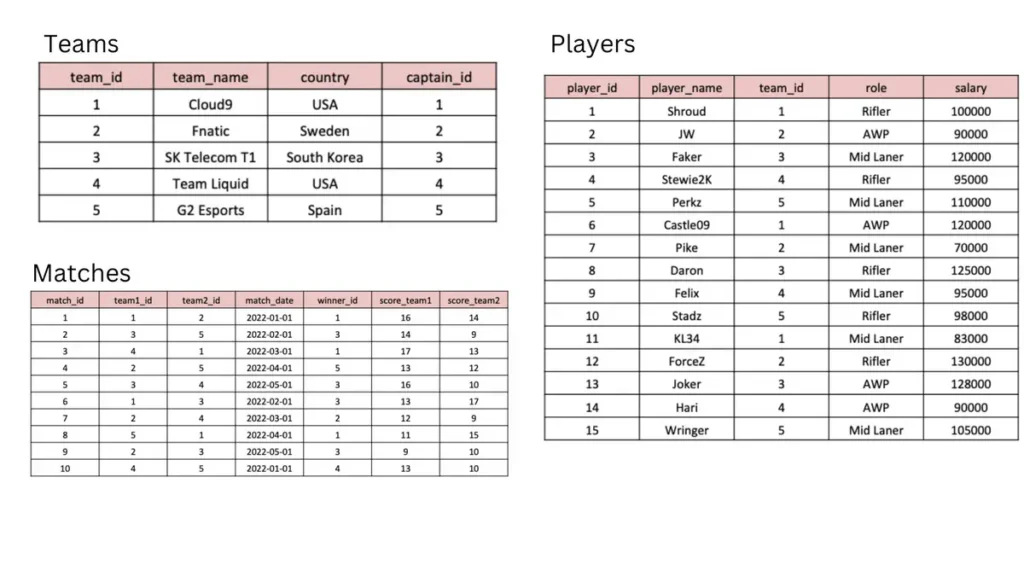
|
1 2 3 4 5 6 7 8 9 10 11 12 13 14 15 16 17 18 19 20 21 22 23 24 25 26 27 28 29 30 31 32 33 34 35 36 37 38 39 40 41 42 43 44 45 46 47 48 49 50 51 52 53 54 55 56 57 58 59 60 61 62 63 64 65 |
<span class="line"><span class="cl"><span class="k">CREATE</span> <span class="k">TABLE</span> <span class="n">teams</span> <span class="p">(</span> </span></span><span class="line"><span class="cl"> <span class="n">team_id</span> <span class="nb">INT</span> <span class="k">PRIMARY</span> <span class="k">KEY</span><span class="p">,</span> </span></span><span class="line"><span class="cl"> <span class="n">team_name</span> <span class="nb">VARCHAR</span><span class="p">(</span><span class="mi">50</span><span class="p">)</span> <span class="k">NOT</span> <span class="k">NULL</span><span class="p">,</span> </span></span><span class="line"><span class="cl"> <span class="n">country</span> <span class="nb">VARCHAR</span><span class="p">(</span><span class="mi">50</span><span class="p">),</span> </span></span><span class="line"><span class="cl"> <span class="n">captain_id</span> <span class="nb">INT</span> </span></span><span class="line"><span class="cl"><span class="p">);</span> </span></span><span class="line"><span class="cl"><span class="c1">-------------------- </span></span></span><span class="line"><span class="cl"><span class="k">INSERT</span> <span class="k">INTO</span> <span class="n">teams</span> <span class="p">(</span><span class="n">team_id</span><span class="p">,</span> <span class="n">team_name</span><span class="p">,</span> <span class="n">country</span><span class="p">,</span> <span class="n">captain_id</span><span class="p">)</span> </span></span><span class="line"><span class="cl"><span class="k">VALUES</span> <span class="p">(</span><span class="mi">1</span><span class="p">,</span> <span class="s1">'Cloud9'</span><span class="p">,</span> <span class="s1">'USA'</span><span class="p">,</span> <span class="mi">1</span><span class="p">),</span> </span></span><span class="line"><span class="cl"><span class="p">(</span><span class="mi">2</span><span class="p">,</span> <span class="s1">'Fnatic'</span><span class="p">,</span> <span class="s1">'Sweden'</span><span class="p">,</span> <span class="mi">2</span><span class="p">),</span> </span></span><span class="line"><span class="cl"><span class="p">(</span><span class="mi">3</span><span class="p">,</span> <span class="s1">'SK Telecom T1'</span><span class="p">,</span> <span class="s1">'South Korea'</span><span class="p">,</span> <span class="mi">3</span><span class="p">),</span> </span></span><span class="line"><span class="cl"><span class="p">(</span><span class="mi">4</span><span class="p">,</span> <span class="s1">'Team Liquid'</span><span class="p">,</span> <span class="s1">'USA'</span><span class="p">,</span> <span class="mi">4</span><span class="p">),</span> </span></span><span class="line"><span class="cl"><span class="p">(</span><span class="mi">5</span><span class="p">,</span> <span class="s1">'G2 Esports'</span><span class="p">,</span> <span class="s1">'Spain'</span><span class="p">,</span> <span class="mi">5</span><span class="p">);</span> </span></span><span class="line"><span class="cl"><span class="c1">-------------------- </span></span></span><span class="line"><span class="cl"><span class="k">CREATE</span> <span class="k">TABLE</span> <span class="n">players</span> <span class="p">(</span> </span></span><span class="line"><span class="cl"><span class="n">player_id</span> <span class="nb">INT</span> <span class="k">PRIMARY</span> <span class="k">KEY</span><span class="p">,</span> </span></span><span class="line"><span class="cl"><span class="n">player_name</span> <span class="nb">VARCHAR</span><span class="p">(</span><span class="mi">50</span><span class="p">)</span> <span class="k">NOT</span> <span class="k">NULL</span><span class="p">,</span> </span></span><span class="line"><span class="cl"><span class="n">team_id</span> <span class="nb">INT</span><span class="p">,</span> </span></span><span class="line"><span class="cl"><span class="k">role</span> <span class="nb">VARCHAR</span><span class="p">(</span><span class="mi">50</span><span class="p">),</span> </span></span><span class="line"><span class="cl"><span class="n">salary</span> <span class="nb">INT</span><span class="p">,</span> </span></span><span class="line"><span class="cl"><span class="k">FOREIGN</span> <span class="k">KEY</span> <span class="p">(</span><span class="n">team_id</span><span class="p">)</span> <span class="k">REFERENCES</span> <span class="n">teams</span><span class="p">(</span><span class="n">team_id</span><span class="p">)</span> </span></span><span class="line"><span class="cl"><span class="p">);</span> </span></span><span class="line"><span class="cl"><span class="c1">-------------------- </span></span></span><span class="line"><span class="cl"><span class="k">INSERT</span> <span class="k">INTO</span> <span class="n">players</span> <span class="p">(</span><span class="n">player_id</span><span class="p">,</span> <span class="n">player_name</span><span class="p">,</span> <span class="n">team_id</span><span class="p">,</span> <span class="k">role</span><span class="p">,</span> <span class="n">salary</span><span class="p">)</span> </span></span><span class="line"><span class="cl"><span class="k">VALUES</span> <span class="p">(</span><span class="mi">1</span><span class="p">,</span> <span class="s1">'Shroud'</span><span class="p">,</span> <span class="mi">1</span><span class="p">,</span> <span class="s1">'Rifler'</span><span class="p">,</span> <span class="mi">100000</span><span class="p">),</span> </span></span><span class="line"><span class="cl"><span class="p">(</span><span class="mi">2</span><span class="p">,</span> <span class="s1">'JW'</span><span class="p">,</span> <span class="mi">2</span><span class="p">,</span> <span class="s1">'AWP'</span><span class="p">,</span> <span class="mi">90000</span><span class="p">),</span> </span></span><span class="line"><span class="cl"><span class="p">(</span><span class="mi">3</span><span class="p">,</span> <span class="s1">'Faker'</span><span class="p">,</span> <span class="mi">3</span><span class="p">,</span> <span class="s1">'Mid laner'</span><span class="p">,</span> <span class="mi">120000</span><span class="p">),</span> </span></span><span class="line"><span class="cl"><span class="p">(</span><span class="mi">4</span><span class="p">,</span> <span class="s1">'Stewie2k'</span><span class="p">,</span> <span class="mi">4</span><span class="p">,</span> <span class="s1">'Rifler'</span><span class="p">,</span> <span class="mi">95000</span><span class="p">),</span> </span></span><span class="line"><span class="cl"><span class="p">(</span><span class="mi">5</span><span class="p">,</span> <span class="s1">'Perkz'</span><span class="p">,</span> <span class="mi">5</span><span class="p">,</span> <span class="s1">'Mid laner'</span><span class="p">,</span> <span class="mi">110000</span><span class="p">),</span> </span></span><span class="line"><span class="cl"><span class="p">(</span><span class="mi">6</span><span class="p">,</span> <span class="s1">'Castle09'</span><span class="p">,</span> <span class="mi">1</span><span class="p">,</span> <span class="s1">'AWP'</span><span class="p">,</span> <span class="mi">120000</span><span class="p">),</span> </span></span><span class="line"><span class="cl"><span class="p">(</span><span class="mi">7</span><span class="p">,</span> <span class="s1">'Pike'</span><span class="p">,</span> <span class="mi">2</span><span class="p">,</span> <span class="s1">'Mid Laner'</span><span class="p">,</span> <span class="mi">70000</span><span class="p">),</span> </span></span><span class="line"><span class="cl"><span class="p">(</span><span class="mi">8</span><span class="p">,</span> <span class="s1">'Daron'</span><span class="p">,</span> <span class="mi">3</span><span class="p">,</span> <span class="s1">'Rifler'</span><span class="p">,</span> <span class="mi">125000</span><span class="p">),</span> </span></span><span class="line"><span class="cl"><span class="p">(</span><span class="mi">9</span><span class="p">,</span> <span class="s1">'Felix'</span><span class="p">,</span> <span class="mi">4</span><span class="p">,</span> <span class="s1">'Mid Laner'</span><span class="p">,</span> <span class="mi">95000</span><span class="p">),</span> </span></span><span class="line"><span class="cl"><span class="p">(</span><span class="mi">10</span><span class="p">,</span> <span class="s1">'Stadz'</span><span class="p">,</span> <span class="mi">5</span><span class="p">,</span> <span class="s1">'Rifler'</span><span class="p">,</span> <span class="mi">98000</span><span class="p">),</span> </span></span><span class="line"><span class="cl"><span class="p">(</span><span class="mi">11</span><span class="p">,</span> <span class="s1">'KL34'</span><span class="p">,</span> <span class="mi">1</span><span class="p">,</span> <span class="s1">'Mid Laner'</span><span class="p">,</span> <span class="mi">83000</span><span class="p">),</span> </span></span><span class="line"><span class="cl"><span class="p">(</span><span class="mi">12</span><span class="p">,</span> <span class="s1">'ForceZ'</span><span class="p">,</span> <span class="mi">2</span><span class="p">,</span> <span class="s1">'Rifler'</span><span class="p">,</span> <span class="mi">130000</span><span class="p">),</span> </span></span><span class="line"><span class="cl"><span class="p">(</span><span class="mi">13</span><span class="p">,</span> <span class="s1">'Joker'</span><span class="p">,</span> <span class="mi">3</span><span class="p">,</span> <span class="s1">'AWP'</span><span class="p">,</span> <span class="mi">128000</span><span class="p">),</span> </span></span><span class="line"><span class="cl"><span class="p">(</span><span class="mi">14</span><span class="p">,</span> <span class="s1">'Hari'</span><span class="p">,</span> <span class="mi">4</span><span class="p">,</span> <span class="s1">'AWP'</span><span class="p">,</span> <span class="mi">90000</span><span class="p">),</span> </span></span><span class="line"><span class="cl"><span class="p">(</span><span class="mi">15</span><span class="p">,</span> <span class="s1">'Wringer'</span><span class="p">,</span> <span class="mi">5</span><span class="p">,</span> <span class="s1">'Mid laner'</span><span class="p">,</span> <span class="mi">105000</span><span class="p">);</span> </span></span><span class="line"><span class="cl"><span class="c1">-------------------- </span></span></span><span class="line"><span class="cl"><span class="k">CREATE</span> <span class="k">TABLE</span> <span class="n">matches</span> <span class="p">(</span> </span></span><span class="line"><span class="cl"><span class="n">match_id</span> <span class="nb">INT</span> <span class="k">PRIMARY</span> <span class="k">KEY</span><span class="p">,</span> </span></span><span class="line"><span class="cl"><span class="n">team1_id</span> <span class="nb">INT</span><span class="p">,</span> </span></span><span class="line"><span class="cl"><span class="n">team2_id</span> <span class="nb">INT</span><span class="p">,</span> </span></span><span class="line"><span class="cl"><span class="n">match_date</span> <span class="nb">DATE</span><span class="p">,</span> </span></span><span class="line"><span class="cl"><span class="n">winner_id</span> <span class="nb">INT</span><span class="p">,</span> </span></span><span class="line"><span class="cl"><span class="n">score_team1</span> <span class="nb">INT</span><span class="p">,</span> </span></span><span class="line"><span class="cl"><span class="n">score_team2</span> <span class="nb">INT</span><span class="p">,</span> </span></span><span class="line"><span class="cl"><span class="k">FOREIGN</span> <span class="k">KEY</span> <span class="p">(</span><span class="n">team1_id</span><span class="p">)</span> <span class="k">REFERENCES</span> <span class="n">teams</span><span class="p">(</span><span class="n">team_id</span><span class="p">),</span> </span></span><span class="line"><span class="cl"><span class="k">FOREIGN</span> <span class="k">KEY</span> <span class="p">(</span><span class="n">team2_id</span><span class="p">)</span> <span class="k">REFERENCES</span> <span class="n">teams</span><span class="p">(</span><span class="n">team_id</span><span class="p">),</span> </span></span><span class="line"><span class="cl"><span class="k">FOREIGN</span> <span class="k">KEY</span> <span class="p">(</span><span class="n">winner_id</span><span class="p">)</span> <span class="k">REFERENCES</span> <span class="n">teams</span><span class="p">(</span><span class="n">team_id</span><span class="p">)</span> </span></span><span class="line"><span class="cl"><span class="p">);</span> </span></span><span class="line"><span class="cl"><span class="c1">-------------------- </span></span></span><span class="line"><span class="cl"><span class="k">INSERT</span> <span class="k">INTO</span> <span class="n">matches</span> <span class="p">(</span><span class="n">match_id</span><span class="p">,</span> <span class="n">team1_id</span><span class="p">,</span> <span class="n">team2_id</span><span class="p">,</span> <span class="n">match_date</span><span class="p">,</span> <span class="n">winner_id</span><span class="p">,</span> <span class="n">score_team1</span><span class="p">,</span> <span class="n">score_team2</span><span class="p">)</span> </span></span><span class="line"><span class="cl"><span class="k">VALUES</span> <span class="p">(</span><span class="mi">1</span><span class="p">,</span> <span class="mi">1</span><span class="p">,</span> <span class="mi">2</span><span class="p">,</span> <span class="s1">'2022-01-01'</span><span class="p">,</span> <span class="mi">1</span><span class="p">,</span> <span class="mi">16</span><span class="p">,</span> <span class="mi">14</span><span class="p">),</span> </span></span><span class="line"><span class="cl"><span class="p">(</span><span class="mi">2</span><span class="p">,</span> <span class="mi">3</span><span class="p">,</span> <span class="mi">5</span><span class="p">,</span> <span class="s1">'2022-02-01'</span><span class="p">,</span> <span class="mi">3</span><span class="p">,</span> <span class="mi">14</span><span class="p">,</span> <span class="mi">9</span><span class="p">),</span> </span></span><span class="line"><span class="cl"><span class="p">(</span><span class="mi">3</span><span class="p">,</span> <span class="mi">4</span><span class="p">,</span> <span class="mi">1</span><span class="p">,</span> <span class="s1">'2022-03-01'</span><span class="p">,</span> <span class="mi">1</span><span class="p">,</span> <span class="mi">17</span><span class="p">,</span> <span class="mi">13</span><span class="p">),</span> </span></span><span class="line"><span class="cl"><span class="p">(</span><span class="mi">4</span><span class="p">,</span> <span class="mi">2</span><span class="p">,</span> <span class="mi">5</span><span class="p">,</span> <span class="s1">'2022-04-01'</span><span class="p">,</span> <span class="mi">5</span><span class="p">,</span> <span class="mi">13</span><span class="p">,</span> <span class="mi">12</span><span class="p">),</span> </span></span><span class="line"><span class="cl"><span class="p">(</span><span class="mi">5</span><span class="p">,</span> <span class="mi">3</span><span class="p">,</span> <span class="mi">4</span><span class="p">,</span> <span class="s1">'2022-05-01'</span><span class="p">,</span> <span class="mi">3</span><span class="p">,</span> <span class="mi">16</span><span class="p">,</span> <span class="mi">10</span><span class="p">),</span> </span></span><span class="line"><span class="cl"><span class="p">(</span><span class="mi">6</span><span class="p">,</span> <span class="mi">1</span><span class="p">,</span> <span class="mi">3</span><span class="p">,</span> <span class="s1">'2022-02-01'</span><span class="p">,</span> <span class="mi">3</span><span class="p">,</span> <span class="mi">13</span><span class="p">,</span> <span class="mi">17</span><span class="p">),</span> </span></span><span class="line"><span class="cl"><span class="p">(</span><span class="mi">7</span><span class="p">,</span> <span class="mi">2</span><span class="p">,</span> <span class="mi">4</span><span class="p">,</span> <span class="s1">'2022-03-01'</span><span class="p">,</span> <span class="mi">2</span><span class="p">,</span> <span class="mi">12</span><span class="p">,</span> <span class="mi">9</span><span class="p">),</span> </span></span><span class="line"><span class="cl"><span class="p">(</span><span class="mi">8</span><span class="p">,</span> <span class="mi">5</span><span class="p">,</span> <span class="mi">1</span><span class="p">,</span> <span class="s1">'2022-04-01'</span><span class="p">,</span> <span class="mi">1</span><span class="p">,</span> <span class="mi">11</span><span class="p">,</span> <span class="mi">15</span><span class="p">),</span> </span></span><span class="line"><span class="cl"><span class="p">(</span><span class="mi">9</span><span class="p">,</span> <span class="mi">2</span><span class="p">,</span> <span class="mi">3</span><span class="p">,</span> <span class="s1">'2022-05-01'</span><span class="p">,</span> <span class="mi">3</span><span class="p">,</span> <span class="mi">9</span><span class="p">,</span> <span class="mi">10</span><span class="p">),</span> </span></span><span class="line"><span class="cl"><span class="p">(</span><span class="mi">10</span><span class="p">,</span> <span class="mi">4</span><span class="p">,</span> <span class="mi">5</span><span class="p">,</span> <span class="s1">'2022-01-01'</span><span class="p">,</span> <span class="mi">4</span><span class="p">,</span> <span class="mi">13</span><span class="p">,</span> <span class="mi">10</span><span class="p">);</span> </span></span> |
Click here to follow along and answer the questions:
|
1 2 3 4 |
<span class="line"><span class="cl"><span class="k">SELECT</span> <span class="n">p</span><span class="p">.</span><span class="n">player_name</span><span class="p">,</span> <span class="n">p</span><span class="p">.</span><span class="n">salary</span> </span></span><span class="line"><span class="cl"><span class="k">FROM</span> <span class="n">players</span> <span class="k">AS</span> <span class="n">p</span> </span></span><span class="line"><span class="cl"><span class="k">WHERE</span> <span class="n">p</span><span class="p">.</span><span class="n">salary</span> <span class="o">></span> <span class="mi">100000</span><span class="p">;</span> </span></span> |
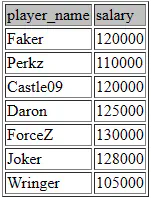
|
1 2 3 4 5 |
<span class="line"><span class="cl"><span class="k">SELECT</span> <span class="n">p</span><span class="p">.</span><span class="n">player_id</span><span class="p">,</span> <span class="n">t</span><span class="p">.</span><span class="n">team_name</span> </span></span><span class="line"><span class="cl"><span class="k">FROM</span> <span class="n">teams</span> <span class="k">AS</span> <span class="n">t</span> </span></span><span class="line"><span class="cl"><span class="k">JOIN</span> <span class="n">players</span> <span class="k">AS</span> <span class="n">p</span> <span class="k">ON</span> <span class="n">t</span><span class="p">.</span><span class="n">team_id</span> <span class="o">=</span> <span class="n">p</span><span class="p">.</span><span class="n">team_id</span> </span></span><span class="line"><span class="cl"><span class="k">WHERE</span> <span class="n">p</span><span class="p">.</span><span class="n">player_id</span> <span class="o">=</span> <span class="mi">3</span><span class="p">;</span> </span></span> |

|
1 2 3 4 5 |
<span class="line"><span class="cl"><span class="k">SELECT</span> <span class="n">t</span><span class="p">.</span><span class="n">team_id</span><span class="p">,</span> <span class="n">t</span><span class="p">.</span><span class="n">team_name</span><span class="p">,</span> <span class="k">COUNT</span><span class="p">(</span><span class="n">p</span><span class="p">.</span><span class="n">player_name</span><span class="p">)</span> <span class="k">AS</span> <span class="n">total_players</span> </span></span><span class="line"><span class="cl"><span class="k">FROM</span> <span class="n">teams</span> <span class="k">AS</span> <span class="n">t</span> </span></span><span class="line"><span class="cl"><span class="k">JOIN</span> <span class="n">players</span> <span class="k">AS</span> <span class="n">p</span> <span class="k">ON</span> <span class="n">t</span><span class="p">.</span><span class="n">team_id</span> <span class="o">=</span> <span class="n">p</span><span class="p">.</span><span class="n">team_id</span> </span></span><span class="line"><span class="cl"><span class="k">GROUP</span> <span class="k">BY</span> <span class="n">t</span><span class="p">.</span><span class="n">team_id</span><span class="p">;</span> </span></span> |
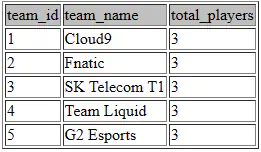
|
1 2 3 4 5 6 7 |
<span class="line"><span class="cl"><span class="k">SELECT</span> <span class="n">t</span><span class="p">.</span><span class="n">team_id</span><span class="p">,</span> <span class="n">t</span><span class="p">.</span><span class="n">team_name</span><span class="p">,</span> <span class="n">p</span><span class="p">.</span><span class="n">player_name</span> <span class="k">AS</span> <span class="n">captain_name</span> </span></span><span class="line"><span class="cl"><span class="k">FROM</span> <span class="n">teams</span> <span class="k">AS</span> <span class="n">t</span> </span></span><span class="line"><span class="cl"><span class="k">JOIN</span> <span class="n">players</span> <span class="k">AS</span> <span class="n">p</span> <span class="k">ON</span> <span class="n">t</span><span class="p">.</span><span class="n">team_id</span> <span class="o">=</span> <span class="n">p</span><span class="p">.</span><span class="n">team_id</span> </span></span><span class="line"><span class="cl"><span class="k">WHERE</span> <span class="n">p</span><span class="p">.</span><span class="n">team_id</span> <span class="o">=</span> <span class="mi">2</span> </span></span><span class="line"><span class="cl"><span class="k">ORDER</span> <span class="k">BY</span> <span class="n">p</span><span class="p">.</span><span class="n">salary</span> <span class="k">DESC</span> </span></span><span class="line"><span class="cl"><span class="k">LIMIT</span> <span class="mi">1</span><span class="p">;</span> </span></span> |

|
1 2 3 4 |
<span class="line"><span class="cl"><span class="k">SELECT</span> <span class="n">player_name</span><span class="p">,</span> <span class="k">role</span> </span></span><span class="line"><span class="cl"><span class="k">FROM</span> <span class="n">players</span> </span></span><span class="line"><span class="cl"><span class="k">WHERE</span> <span class="n">team_id</span> <span class="o">=</span> <span class="mi">1</span><span class="p">;</span> </span></span> |
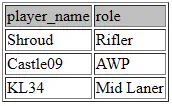
|
1 2 3 4 5 |
<span class="line"><span class="cl"><span class="k">SELECT</span> <span class="n">t</span><span class="p">.</span><span class="n">team_name</span><span class="p">,</span> <span class="k">COUNT</span><span class="p">(</span><span class="n">m</span><span class="p">.</span><span class="n">winner_id</span><span class="p">)</span> <span class="k">AS</span> <span class="n">matches_won</span> </span></span><span class="line"><span class="cl"><span class="k">FROM</span> <span class="n">teams</span> <span class="k">AS</span> <span class="n">t</span> </span></span><span class="line"><span class="cl"><span class="k">JOIN</span> <span class="n">matches</span> <span class="k">AS</span> <span class="n">m</span> <span class="k">ON</span> <span class="n">t</span><span class="p">.</span><span class="n">team_id</span> <span class="o">=</span> <span class="n">m</span><span class="p">.</span><span class="n">winner_id</span> </span></span><span class="line"><span class="cl"><span class="k">GROUP</span> <span class="k">BY</span> <span class="n">m</span><span class="p">.</span><span class="n">winner_id</span><span class="p">;</span> </span></span> |
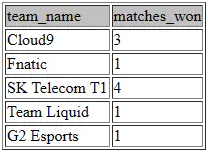
|
1 2 3 4 5 |
<span class="line"><span class="cl"><span class="k">SELECT</span> <span class="n">t</span><span class="p">.</span><span class="n">country</span><span class="p">,</span> <span class="n">ROUND</span><span class="p">(</span><span class="k">AVG</span><span class="p">(</span><span class="n">p</span><span class="p">.</span><span class="n">salary</span><span class="p">))</span> <span class="k">AS</span> <span class="n">players_avg_salary</span> </span></span><span class="line"><span class="cl"><span class="k">FROM</span> <span class="n">players</span> <span class="k">AS</span> <span class="n">p</span> </span></span><span class="line"><span class="cl"><span class="k">JOIN</span> <span class="n">teams</span> <span class="k">AS</span> <span class="n">t</span> <span class="k">ON</span> <span class="n">p</span><span class="p">.</span><span class="n">team_id</span> <span class="o">=</span> <span class="n">t</span><span class="p">.</span><span class="n">team_id</span> </span></span><span class="line"><span class="cl"><span class="k">WHERE</span> <span class="n">t</span><span class="p">.</span><span class="n">country</span> <span class="o">=</span> <span class="s1">'USA'</span><span class="p">;</span> </span></span> |

|
1 2 3 4 5 6 7 |
<span class="line"><span class="cl"><span class="k">SELECT</span> <span class="n">t</span><span class="p">.</span><span class="n">team_name</span><span class="p">,</span> <span class="k">COUNT</span><span class="p">(</span><span class="n">m</span><span class="p">.</span><span class="n">winner_id</span><span class="p">)</span> <span class="k">AS</span> <span class="n">matches_won</span> </span></span><span class="line"><span class="cl"><span class="k">FROM</span> <span class="n">teams</span> <span class="k">AS</span> <span class="n">t</span> </span></span><span class="line"><span class="cl"><span class="k">JOIN</span> <span class="n">matches</span> <span class="k">AS</span> <span class="n">m</span> <span class="k">ON</span> <span class="n">t</span><span class="p">.</span><span class="n">team_id</span> <span class="o">=</span> <span class="n">m</span><span class="p">.</span><span class="n">winner_id</span> </span></span><span class="line"><span class="cl"><span class="k">GROUP</span> <span class="k">BY</span> <span class="n">m</span><span class="p">.</span><span class="n">winner_id</span> </span></span><span class="line"><span class="cl"><span class="k">ORDER</span> <span class="k">BY</span> <span class="n">matches_won</span> <span class="k">DESC</span> </span></span><span class="line"><span class="cl"><span class="k">LIMIT</span> <span class="mi">1</span><span class="p">;</span> </span></span> |

|
1 2 3 4 5 6 7 8 9 10 |
<span class="line"><span class="cl"><span class="k">SELECT</span> </span></span><span class="line"><span class="cl"> <span class="n">t</span><span class="p">.</span><span class="n">team_id</span><span class="p">,</span> </span></span><span class="line"><span class="cl"> <span class="n">t</span><span class="p">.</span><span class="n">team_name</span><span class="p">,</span> </span></span><span class="line"><span class="cl"> <span class="k">COUNT</span><span class="p">(</span><span class="n">p</span><span class="p">.</span><span class="n">player_name</span><span class="p">)</span> <span class="k">AS</span> <span class="n">total_players</span><span class="p">,</span> </span></span><span class="line"><span class="cl"> <span class="k">SUM</span><span class="p">(</span><span class="n">p</span><span class="p">.</span><span class="n">salary</span><span class="p">)</span> <span class="k">AS</span> <span class="n">sum_salary</span> </span></span><span class="line"><span class="cl"><span class="k">FROM</span> <span class="n">players</span> <span class="k">AS</span> <span class="n">p</span> </span></span><span class="line"><span class="cl"><span class="k">JOIN</span> <span class="n">teams</span> <span class="k">AS</span> <span class="n">t</span> <span class="k">ON</span> <span class="n">p</span><span class="p">.</span><span class="n">team_id</span> <span class="o">=</span> <span class="n">t</span><span class="p">.</span><span class="n">team_id</span> </span></span><span class="line"><span class="cl"><span class="k">WHERE</span> <span class="n">p</span><span class="p">.</span><span class="n">salary</span> <span class="o">></span> <span class="mi">100000</span> </span></span><span class="line"><span class="cl"><span class="k">GROUP</span> <span class="k">BY</span> <span class="n">t</span><span class="p">.</span><span class="n">team_id</span><span class="p">;</span> </span></span> |
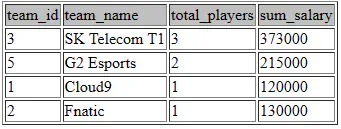
|
1 2 3 4 |
<span class="line"><span class="cl"><span class="k">SELECT</span> <span class="n">match_date</span><span class="p">,</span> <span class="n">score_team1</span><span class="p">,</span> <span class="n">score_team2</span> </span></span><span class="line"><span class="cl"><span class="k">FROM</span> <span class="n">matches</span> </span></span><span class="line"><span class="cl"><span class="k">WHERE</span> <span class="n">match_id</span> <span class="o">=</span> <span class="mi">3</span><span class="p">;</span> </span></span> |

As the curtain falls on this epic tournament, the SQL queries provided a window into the dynamics of the competition, answering crucial questions such as the names of players with salaries exceeding $100,000, team details for specific players, overall team statistics, and the outcomes of pivotal matches. This voyage of data analysis has not only illuminated the intricacies of the tournament but has also set the stage for informed decisions and a deeper understanding of the eSports landscape. Let the analysis stand as a testament to the power of data in uncovering the narratives within the realm of competitive gaming.
Adopted form Steel Data.